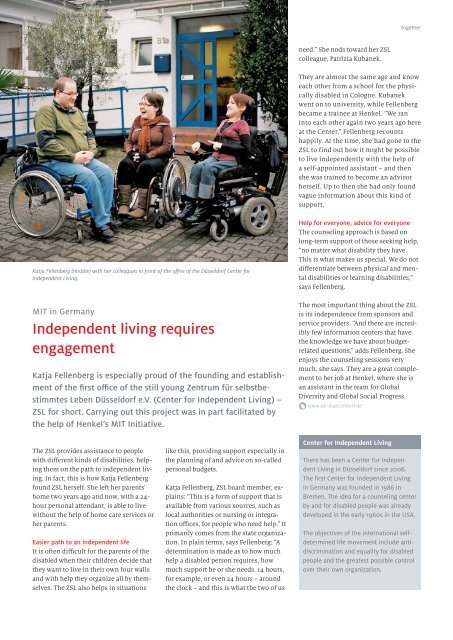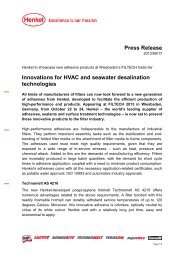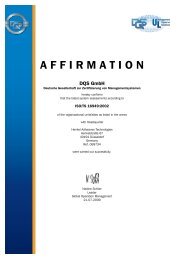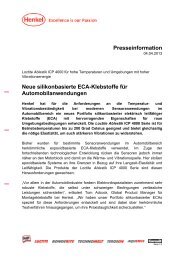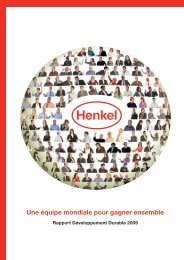Together Issue 2012 - Henkel
Together Issue 2012 - Henkel
Together Issue 2012 - Henkel
You also want an ePaper? Increase the reach of your titles
YUMPU automatically turns print PDFs into web optimized ePapers that Google loves.
Katja Fellenberg (middle) with her colleagues in front of the offi ce of the Düsseldorf Center for<br />
Independent Living.<br />
MIT in Germany<br />
Independent living requires<br />
engagement<br />
Katja Fellenberg is especially proud of the founding and establishment<br />
of the fi rst offi ce of the still young Zentrum für selbstbestimmtes<br />
Leben Düsseldorf e.V. (Center for Independent Living) –<br />
ZSL for short. Carrying out this project was in part facilitated by<br />
the help of <strong>Henkel</strong>’s MIT Initiative.<br />
The ZSL provides assistance to people<br />
with diff erent kinds of disabilities, helping<br />
them on the path to independent living.<br />
In fact, this is how Katja Fellenberg<br />
found ZSL herself. She left her parents'<br />
home two years ago and now, with a 24hour<br />
personal attendant, is able to live<br />
without the help of home care services or<br />
her parents.<br />
Easier path to an independent life<br />
It is often diffi cult for the parents of the<br />
disabled when their children decide that<br />
they want to live in their own four walls<br />
and with help they organize all by themselves.<br />
The ZSL also helps in situations<br />
like this, providing support especially in<br />
the planning of and advice on so-called<br />
personal budgets.<br />
Katja Fellenberg, ZSL board member, explains:<br />
“This is a form of support that is<br />
available from various sources, such as<br />
local authorities or nursing or integration<br />
offi ces, for people who need help.” It<br />
primarily comes from the state organization.<br />
In plain terms, says Fellenberg: “A<br />
determination is made as to how much<br />
help a disabled person requires, how<br />
much support he or she needs. 14 hours,<br />
for example, or even 24 hours – around<br />
the clock – and this is what the two of us<br />
need.” She nods toward her ZSL<br />
colleague, Patrizia Kubanek.<br />
Center for Independent Living<br />
<strong>Together</strong><br />
They are almost the same age and know<br />
each other from a school for the physically<br />
disabled in Cologne. Kubanek<br />
went on to university, while Fellenberg<br />
became a trainee at <strong>Henkel</strong>. “We ran<br />
into each other again two years ago here<br />
at the Center,” Fellenberg recounts<br />
happily. At the time, she had gone to the<br />
ZSL to find out how it might be possible<br />
to live independently with the help of<br />
a self-appointed assistant – and then<br />
she was trained to become an advisor<br />
herself. Up to then she had only found<br />
vague information about this kind of<br />
support.<br />
Help for everyone, advice for everyone<br />
The counseling approach is based on<br />
long-term support of those seeking help,<br />
“no matter what disability they have.<br />
This is what makes us special. We do not<br />
diff erentiate between physical and mental<br />
disabilities or learning disabilities,”<br />
says Fellenberg.<br />
The most important thing about the ZSL<br />
is its independence from sponsors and<br />
service providers. “And there are incredibly<br />
few information centers that have<br />
the knowledge we have about budgetrelated<br />
questions,” adds Fellenberg. She<br />
enjoys the counseling sessions very<br />
much, she says. They are a great complement<br />
to her job at <strong>Henkel</strong>, where she is<br />
an assistant in the team for Global<br />
Diversity and Global Social Progress.<br />
www.zsl-duesseldorf.de<br />
There has been a Center for Independent<br />
Living in Düsseldorf since 2006.<br />
The fi rst Center for Independent Living<br />
in Germany was founded in 1986 in<br />
Bremen. The idea for a counseling center<br />
by and for disabled people was already<br />
developed in the early 1960s in the USA.<br />
The objectives of the international selfdetermined<br />
life movement include antidiscrimination<br />
and equality for disabled<br />
people and the greatest possible control<br />
over their own organization.


